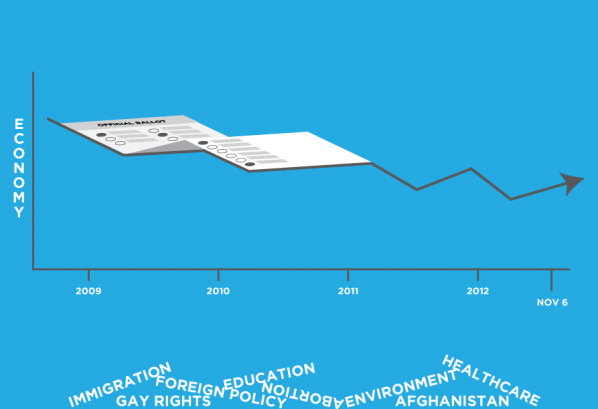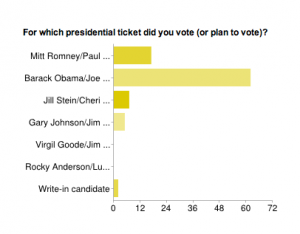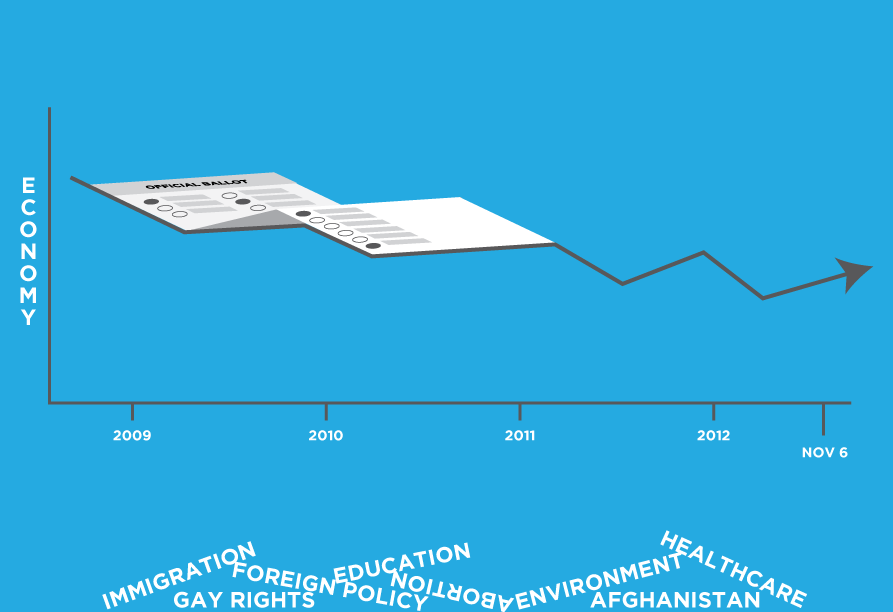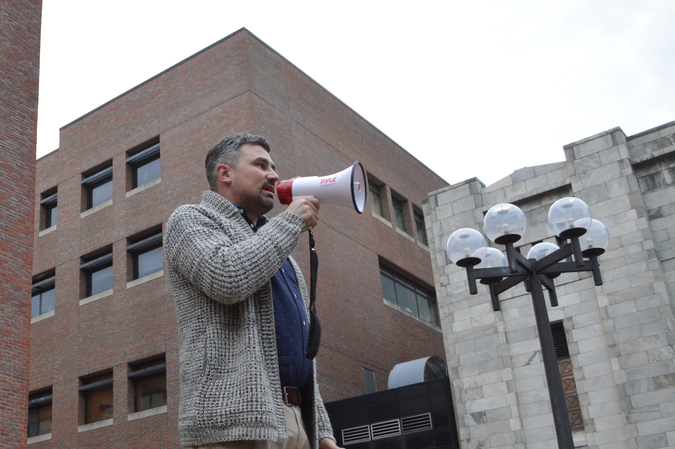
Anyone who has regularly followed American political news over the last year knows that the economy is kind of a big deal–especially when it comes to the presidential election. Sometimes it has seemed like it’s the only issue.
This idea that economic issues are the only ones that matter in this election has permeated much of the discourse among candidates, pundits, and the press. Remember that embarrassing moment in the Republican primaries when Herman Cain said he could not name the president of “Ubeki-beki-beki-beki-stan-stan,” but then added that it didn’t matter because it wouldn’t help him create jobs? (I’m sorry to bring that up again. No, actually, I’m not. That line was hilarious.) This was written off as a gaffe in most circles, but there was something oddly prophetic in Cain’s comment: do voters need to be concerned about matters like foreign policy, the environment, and social issues when the economy still struggles to recover?
According to an October 22 report from Gallup, 37% of Americans say the “economy in general” is the most important issue facing the United States right now, which certainly explains why the candidates have been talking about it a lot. During the first two presidential debates, both candidates repeatedly found ways to go off-topic by talking about their plans for jobs, taxation, government spending, and jobs. I understand that the third presidential debate was different (I wasn’t able to watch it), but I think that’s mostly because they were forced to talk about bayonets and stuff.
Another Gallup study slightly complicated the idea that the economy is the only issue at stake in this election. The October 17 report asked men and women registered to vote in swing states which issues were most important for their respective genders (without much specification) in the November election. When women were asked the question, 39% said abortion and 16% said equal rights/pay/opportunity, while 19% said jobs and 16% said the economy. When men were asked, 38% said jobs and 37% said the economy, but social issues didn’t get very many votes. I think this is probably because when women heard the question, they immediately thought about the kinds of issues brought up by imbeciles like Todd “I Know Nothing About Biology” Akin and Richard “Sometimes I Try to Speak for God” Mourdock.
Or it could be simply that this poll (or any poll, for that matter) doesn’t reflect what will happen in the presidential election. It’s happened before.
It’s not just gender-related issues inspiring voters, either. For example, in the wake of Hurricane Sandy, New York City Mayor Michael Bloomberg endorsed Barack Obama, citing the President’s pro-science stance on climate change as the driving force behind the endorsement. “One sees climate change as an urgent problem that threatens our planet; one does not,” wrote Mayor Bloomberg in his editorial, regarding the two major presidential candidates. “I want our president to place scientific evidence and risk management above electoral politics.”
Amidst all these discussions, how did BU students go about deciding who to vote for? The Quad conducted a poll via Facebook, and the results, with some exceptions, reflected the national trend.
31% of respondents selected the economy as the most important issue to them when voting in this presidential election. The second most important issue was same-sex marriage with 20%, followed by health care with 13% and education with 10%. Since a write-in response was allowed, some students listed issues like campaign finance reform, personal liberties, and NASA funding as the most important matter to them.

“I think there are many important issues, but the economy is the biggest one everyone is focusing on,” said Kimi Weeks (CAS ’16) after completing the poll. “I think until the issue of the economy is solved, they (Congress and the government) won’t be able to fully focus and address other issues with practical solutions.”
George Jiao (ENG ’15) agrees. After the poll, he said, “The welfare of the economy influences the long term stability of many other pertinent issues, such as healthcare, education, social services, and foreign policy.” Though Jiao himself does not plan to vote for Mitt Romney, interestingly, all respondents who do plan on voting for Romney ranked the economy as very important in helping them decide for whom to vote. All but three picked the economy as the most important issue, none said gender-related issues were very important, and only three said abortion was very important in their decision-making process.
Among those voting for Barack Obama, there were a few, more telling trends. About half of Obama supporters ranked the economy as very important and two-thirds said the same of gender-related issues. Three-quarters also said that same-sex marriage was very important in deciding for which presidential ticket to vote.
Obama’s stance on same-sex marriage, different from the one he ran with in 2008, seems to have strengthened his appeal with certain voters. Said Mackenzie Tipton (COM ’15) after completing the poll, “I firmly believe that denying same-sex couples the right to marry is one of the most flagrant examples of bigotry in the country today. Those who oppose giving consenting adults the right to marry based upon their genders are truly on the wrong side of history and will be looked down upon in future generations.”
When it came to the issues Obama supporters ranked as most important, no issue had an absolute majority. 30% chose same-sex marriage, 18% chose the economy, 15% chose health care, and another 15% chose education. Kristen Gast (CAS ’16) said health care was most important in her choice to vote for Obama because her older sister was paralyzed in a car accident earlier this year. “With Obama’s Affordable Care Act, she will be covered, no doubt,” she said in her response. “Romney’s plan (or lack thereof) would leave her high and dry, because she now has a pre-existing condition, and his plan does not cover those. And with Obama, my sister will be able to remain on my parents’ health insurance until age 26, which will give her time to get her life back in order and regain her independence.”
Both from the survey of BU students and general observations, it appears that perspective has a lot to do with how people vote. When Mitt Romney tells supporters in Iowa that Barack Obama cares more about a liberal agenda than the economy, some voters could see that as a good thing. Just the same, every time Obama talks about equal pay for women or legalizing same-sex marriage, some voters see this as a distraction from more important issues. And only time will tell which of these issues dominate government activity in the next four years.



